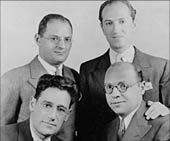Morrie Ryskind facts for kids
Quick facts for kids
Morrie Ryskind
|
|
|---|---|

|
|
| Born | Morris Ryskind October 20, 1895 Brooklyn, New York, U.S. |
| Died | August 24, 1985 (aged 89) Washington, D.C., U.S. |
| Occupation | Dramatist, screenwriter, lyricist, newspaper columnist |
| Nationality | American |
| Years active | 1929-1972 |
| Spouse | Mary House (1929–1985) |
| Children | 2 |
Morris "Morrie" Ryskind (born October 20, 1895 – died August 24, 1985) was an American writer. He created plays, songs, and movie scripts. Later in his life, he became involved in politics, supporting conservative ideas.
Contents
Early Life and Education
Morrie Ryskind was born in Brooklyn, New York. His parents, Ida and Abraham Ryskind, were immigrants from Russia.
He went to Columbia University. However, he was suspended in 1917. This happened right before he was supposed to graduate. He had called the university president, Nicholas Murray Butler, "Czar Nicholas." Ryskind wrote this in the school's humor magazine, Jester. He was upset because Butler would not let a famous Russian writer, Ilya Tolstoy, speak at the university.
Writing for Stage and Screen
From 1927 to 1945, Ryskind wrote many scripts and song lyrics. These were for Broadway shows and Hollywood movies. He also directed some of these productions.
He often worked with George S. Kaufman. Together, they created several popular Broadway shows. In 1933, Ryskind won the Pulitzer Prize for Drama. This is a very important award for writers. He won it for the musical Of Thee I Sing. He wrote this musical with composer George Gershwin. It's interesting that he received the award from the same Nicholas Murray Butler who had suspended him from college!
Ryskind wrote or co-wrote several works for the famous Marx Brothers. He wrote the script for their Broadway musical Animal Crackers (1929). He also wrote the screenplays for their movies The Cocoanuts (1929) and Animal Crackers (1930).
Later, he worked with Kaufman again on the movie A Night at the Opera (1935). This movie helped make the Marx Brothers popular again. The American Film Institute even named it one of the top 100 comedy films. While working on the script, Ryskind helped make sure the jokes were funny. He watched the Marx Brothers perform parts of the movie for live audiences. This helped them figure out which lines worked best.
Ryskind also rewrote the play Room Service (1938) for the Marx Brothers. The original play did not feature them. Ryskind changed the story to fit their unique comedy style.
During this time, Ryskind was nominated twice for an Academy Award. These nominations were for his work on the films My Man Godfrey (1936) and Stage Door (1937). He also wrote the screenplay for the successful movie Penny Serenade. He wrote the stage musical Louisiana Purchase, which later became a movie starring Bob Hope. He also helped produce The Lady Comes Across.
Morrie Ryskind's Political Views
For many years, Morrie Ryskind was a member of the Socialist Party of America. In the 1930s, he took part in their activities. He even performed comedy sketches at events against war. However, he later disagreed with some parts of the party.
His political ideas then started to change. In 1940, Ryskind left the Democratic Party. He did not agree with President Franklin D. Roosevelt running for a third term. Ryskind even wrote a campaign song for the Republican Party candidate, Wendell Willkie, that year. He kept some connections with the Socialist Party in the 1940s. He also served as a leader for the Keep America Out of War Congress.
Around this time, he became friends with other writers like Max Eastman and Ayn Rand. Later, he became friends with William F. Buckley, Jr. and future U.S. President Ronald Reagan. In 1947, he spoke before the House Un-American Activities Committee. This committee investigated people suspected of being disloyal to the U.S. Ryskind was called a "Friendly Witness." After this, Ryskind never sold another script. He believed it was because of his appearance before the committee.
In the 1950s, Ryskind wrote articles for a magazine called The Freeman. In 1954, he was also on the board of the American Jewish League Against Communism.
He later helped William F. Buckley, Jr. start The National Review magazine in 1955. Ryskind was one of the first writers for this magazine. He briefly joined the John Birch Society. But he soon left them. This was because the group started saying that presidents like Roosevelt and Eisenhower were part of a Soviet plan. He also supported the anti-Zionist American Council for Judaism.
In 1960, Ryskind began writing a newspaper column for the Los Angeles Times. For 11 years, he used this column to share his conservative ideas. His son, Allan H. Ryskind, was also a well-known editor for a conservative weekly newspaper called Human Events.
Morrie Ryskind wrote a book about his life called I Shot an Elephant in My Pajamas: The Morrie Ryskind Story. It tells about his adventures from Broadway to Hollywood and how his political views changed.
Stage Productions
- Merry-Go-Round (1927)
- Animal Crackers (1929)
- Ned Wayburn's Gambols (1929)
- Strike up the Band (1930)
- The Gang's All Here (1931)
- Of Thee I Sing (1931) - Won the Pulitzer Prize for Drama
- Pardon My English (1933)
- Let 'Em Eat Cake (1933)
- Louisiana Purchase (1941)
- The Lady Comes Across (1942)
Filmography
- The Cocoanuts (1929)
- Animal Crackers (1930)
- A Night at the Opera (1935)
- My Man Godfrey (1936) - Nominated for an Oscar
- Stage Door (1937) - Nominated for an Oscar
- Room Service (1938)
- Man About Town (1939)
- His Girl Friday (1940)
- Penny Serenade (1941)
- Claudia (1943)
- Where Do We Go From Here? (1945)
- It's in the Bag! (1945)

